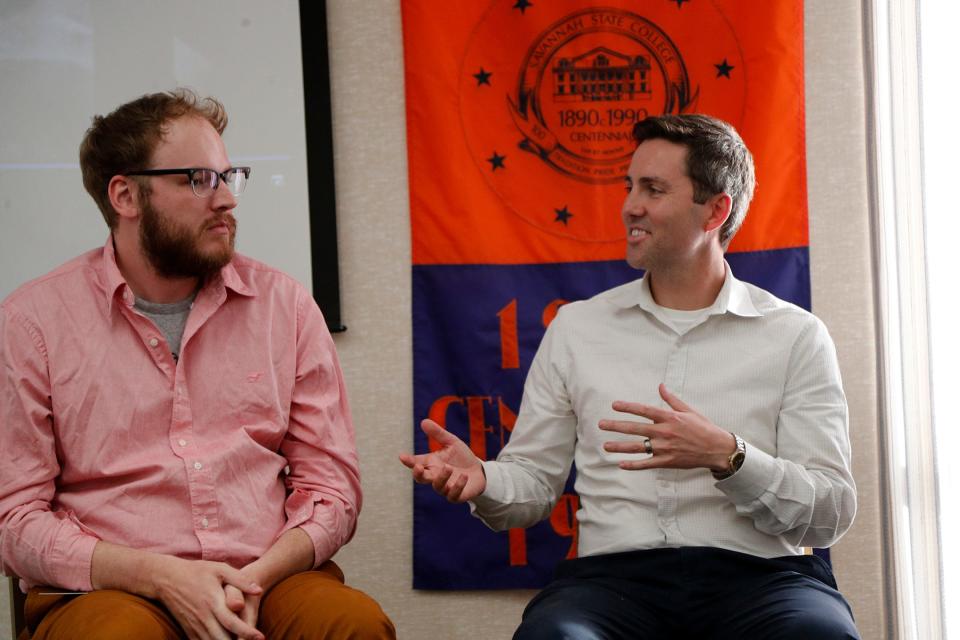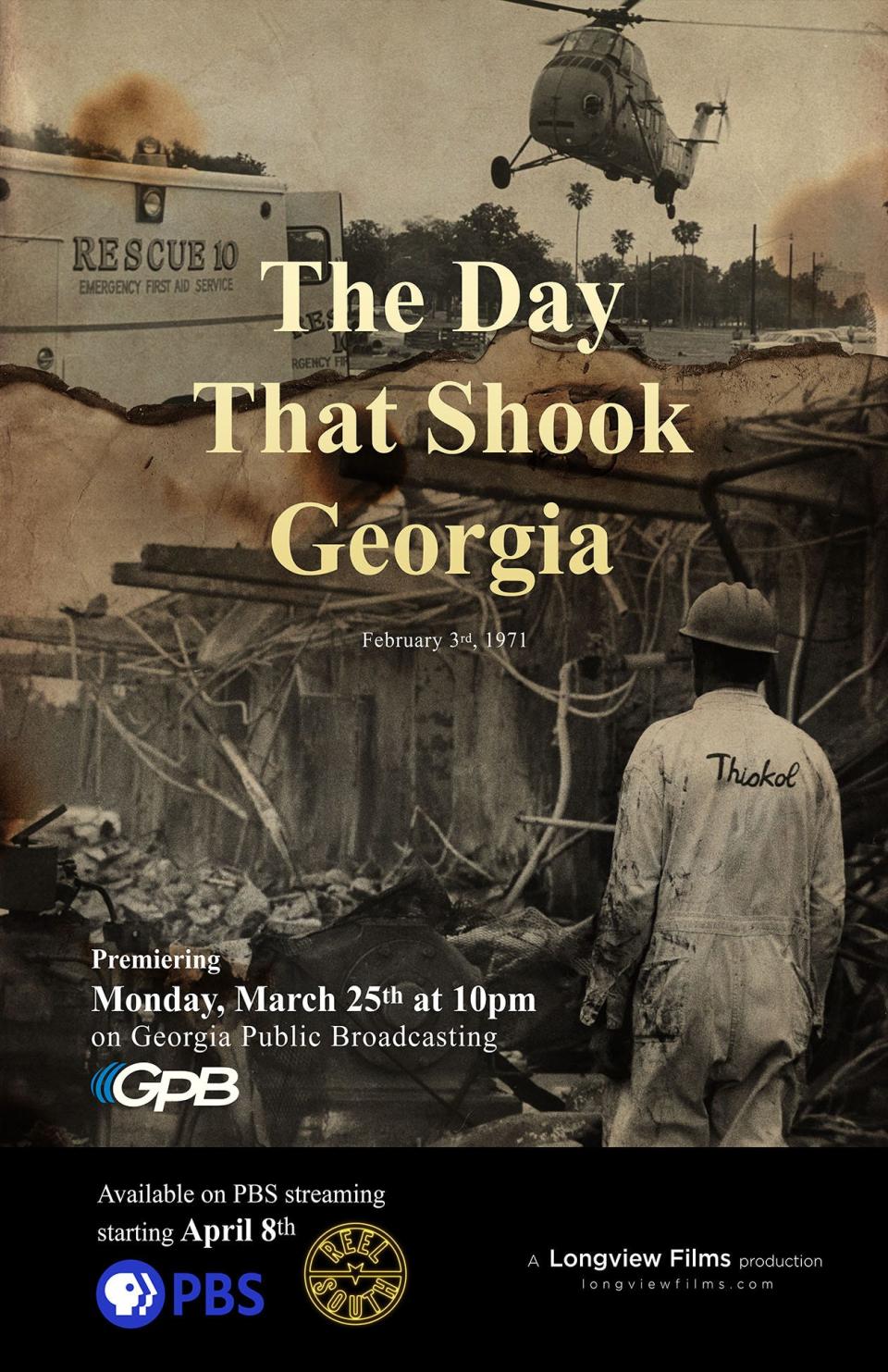Savannah filmmaker's Thiokol explosion documentary debuts on PBS's Reel South on April 8
The Day That Shook Georgia | Trailer from Patrick Longstreth on Vimeo.
Three years ago, Savannah-based filmmaker Patrick Longstreth was reading an article on the nonprofit news site The Current about a piece of Georgia history he’d never heard about, even though it was one of the worst industrial disasters in U.S. history. The article, written by Laura Corley, who is now the education reporter for the Macon Telegraph, recounted how 50 years after a Thiokol munitions plant exploded in Woodbine, Georgia, survivors and relatives of the 29 killed – most of them Black women making less than $2 an hour – on Feb. 3, 1971, still were seeking to have their stories told.
“I was just amazed by all the details and all the interesting historical ties to the story. Everything from the Vietnam War and women in the workplace and civil rights and worker safety and workers’ rights,” said Longstreth, who also examined how the long legal battles for the Thiokol families helped establish the formula for victim’s compensation – the same formula used after the Space Shuttle Challenger catastrophe and 9/11.
Commemoration: Residents of Woodbine remember Thiokol explosion 53 years later

Longstreth, an award-winning visual effects supervisor and documentary filmmaker who often co-directs and edits films with his wife Anne Longstreth, began doing his own research and meeting with Jannie Everette, the CEO and president of the Thiokol Memorial Project, whose mother Lucille Washington Everette was one of the blast’s survivors. He and Anne gathered news articles, memorabilia, records and documents, and recorded oral histories with other survivors, families and first responders still haunted by the explosion.
Their work led to a partnership with the Savannah Morning News and a seven-part podcast series, Tripwire. Fueled by a $5,000 Lavine Fellowship from the Better Angels Society, Patrick Longstreth was able to finish the documentary, “The Day That Shook Georgia.”
![Jannie Everette, president of the Thiokol Memorial Project, delivers her closing remarks. On the 53rd anniversary of the explosion of the Thiokol Plant in Woodbine, GA, the Thiokol Memorial Project, Inc. held a Remembrance and Commemoration ceremony at the PSA Complex in Kingsland, GA.
Photo made February 3, 2024
[Fran Ruchalski for The Savannah Morning News]](https://s.yimg.com/ny/api/res/1.2/lISy1QJBymrBCe.iGg7Liw--/YXBwaWQ9aGlnaGxhbmRlcjt3PTk2MDtoPTYzOQ--/https://media.zenfs.com/en/savannah-morning-news/fabf8038b51716e1ff1357bb24eec877)
Documentary gets nationwide release on PBS's Reel South
“The Day That Shook Georgia” had its first showing when it premiered for a one-time Georgia Public Broadcasting viewing at 10 p.m. on March 25.
The 20-minute film will gain a nationwide audience, however, when it makes its debut on the first episode of the new season of PBS’s Reel South on Monday, April 8. “The Day That Shook Georgia” is paired with another Vietnam-focused documentary, David Brodie’s “The Volunteer,” which reunites Bruce Nakashima, a Vietnam veteran, with the fellow soldier who saved his life during an anti-Asian act of racism within his own company. Afterward, the documentaries will be available for streaming on the PBS app and website.

The film is broken into chapters and opens with Jannie Everette’s crusade to honor the memory of the 29 “patriots,” who were fighting on the homefront for their sons, brothers and husbands who were fighting the war in Vietnam. They manufactured tripflares, devices used by the U.S. military to light up the night sky so that they could take stock of their surroundings in the Southeast Asian jungles, signal for medical help and helicopters, and guard areas against infiltration. Jannie’s deepest desire, other than the continuation of the museum, is that each of the 29 killed receives a Congressional Medal of Honor.
Longstreth illuminates how the magnitude of the explosion rendered segregated hospital beds, emergency rooms and funeral homes useless, as facilities in and responders from Jacksonville, Brunswick and surrounding communities aided the injured and the dead. The tragedy also gave the final nudge to Congress to approve the creation of the Occupational Safety and Health Administration (OSHA).
Then he delves into the long and contentious effort to find the truth of what happened and to get compensation, which took more than 17 years.
“Some people took the worker's comp, but it was much less than they thought they should get, and I don't know if the people who waited 17 years really got that much more than they would have gotten with workers compensation because lawyers took a bunch of money,” Longreth explained. “What is your life worth 17 years of waiting? It was painful, a lot of regret. It divided the community in that way, too, because there was a lot of argument… I really learned a lot in terms of all the tough decisions that into resolving something like this and moving past it.”
He says a lot of the people went back to work at Thiokol, which remained in the Woodbine community for another six years until the bitter end of the Vietnam War.
One of the more interesting people Longstreth spoke with is an ammunition historian for the U.S. Army. He was surprised by the man’s circumspection. “He was very cautious about how we use this stuff and how we can never be too careful, and if you’re going to deal with this stuff, eventually there’s going to be an accident. It doesn’t matter how hard you try… That’s an interesting perspective… not to excuse the accident but just to say that maybe we shouldn’t be using some stuff, or maybe we shouldn’t be handling it or letting civilians handle it.”
The historian encouraged Longstreth to keep digging, too. “It was almost like a coded recommendation or something. He was like, ‘You should really find the government contracts, like the written government contracts that Thiokol got for these tripflares because I think there's some information in there that you're gonna want to know.’”
Longstreth has been amazed by the number of Vietnam veterans and servicemen and women who attend screenings and the annual events commemorating those who perished that February 53 years ago. With the wealth of information he’s gathered through the filming process, he is considering making it a feature-length documentary in the future and is looking for ways to incorporate the story into education at the high school and college levels. The ultimate purpose of both the film and the memorial project that Jannie Everette is spearheading, however, is healing.
This article originally appeared on Savannah Morning News: Savannah filmmaker's documentary of 1971 Thiokol explosion featured on PBS

